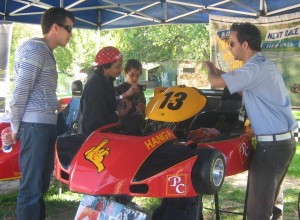 The FAME (Flexible Accredited Meaningful Education) program is dedicated to providing enriching experiences for disadvantaged young people. It is a Christian Brother supported initiative in the Australian city of Adelaide, which operates in partnership with a range of community, educational and service organizations.
The FAME (Flexible Accredited Meaningful Education) program is dedicated to providing enriching experiences for disadvantaged young people. It is a Christian Brother supported initiative in the Australian city of Adelaide, which operates in partnership with a range of community, educational and service organizations.
Students are referred to FAME due to their disengagement from mainstream schooling; they often experience unsettled home and family lives and frequently suffer bouts of homelessness, abuse and neglect.
Although the program includes both male and female students from diverse backgrounds, ranging in age from 12-19, it currently includes a growing group of Indigenous students (mostly young boys) helping them with their socialisation and interaction skills within society.
The program is guided by the Edmund Rice philosophy and principles of social justice, human rights, equity and access. The program strives to achieve justice for these students who constantly seem to experience barriers to access and opportunity within society because of language and cultural differences.
Part of the FAME program seeks to provide enriching and engaging excursions that encourage interaction with other members of the community and their peers in both formal and social settings. Most have little to no experience of attending functions and events held within the community due to financial and family reasons.
Earlier this year the FAME team successfully approached the South Australian government for tickets to a major Australian motorsport event, the Clipsal 500 – an annual racing carnival for touring cars.
The day was a huge success for a group of boys who love cars but who would never have the opportunity to experience such an event. The free food, hats, posters and programs and the chance to meet some of the V8 drivers all contributed to making it a memorable day for all those involved.
(thanks to Katie Miller a teacher with the FAME program who provided the material for this article)
Edmund Rice International applauds the work of those engaged in ministries with disadvantaged young people in different parts of the world (such as FAME) and encourages involvement in advocacy to help remove the barriers to access and opportunity that society places in the way of many young people.
Whilst such advocacy can take place at local and national level, ERI is particularly interested in facilitating advocacy at the international level through the UN.